Letter 8; Variant: The greater part of men are much too exhausted and enervated by their struggle with want to be able to engage in a new and severe contest with error. Satisfied if they themselves can escape from the hard labour of thought, they willingly abandon to others the guardianship of their thoughts.
On the Aesthetic Education of Man (1794)
Context: Dare to be wise! Energy and spirit is needed to overcome the obstacles which indolence of nature as well as cowardice of heart oppose to our instruction. It is not without significance that the old myth makes the goddess of Wisdom emerge fully armed from the head of Jupiter; for her very first function is warlike. Even in her birth she has to maintain a hard struggle with the senses, which do not want to be dragged from their sweet repose. The greater part of humanity is too much harassed and fatigued by the struggle with want, to rally itself for a new and sterner struggle with error. Content if they themselves escape the hard labor of thought, men gladly resign to others the guardianship of their ideas, and if it happens that higher needs are stirred in them, they embrace with a eager faith the formulas which State and priesthood hold in readiness for such an occasion.
Works
Wallenstein
Friedrich Schiller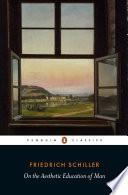
On the Aesthetic Education of Man
Friedrich SchillerOde to Joy
Friedrich Schiller
William Tell
Friedrich SchillerDon Carlos
Friedrich Schiller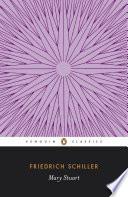
Mary Stuart
Friedrich Schiller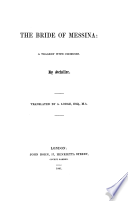
The Bride of Messina
Friedrich Schiller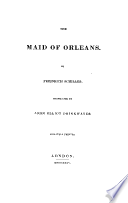
The Maid of Orleans
Friedrich SchillerDie Worte des Glaubens
Friedrich SchillerFiesco
Friedrich Schiller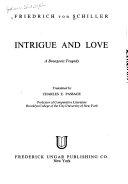
Intrigue and Love
Friedrich SchillerThe Robbers
Friedrich SchillerFamous Friedrich Schiller Quotes
Hope, Faith, and Love (c. 1786); also known as "The Words of Strength", as translated in The Common School Journal Vol. IX (1847) edited by Horace Mann, p. 386
Context: There are three lessons I would write, —
Three words — as with a burning pen,
In tracings of eternal light
Upon the hearts of men. Have Hope. Though clouds environ now,
And gladness hides her face in scorn,
Put thou the shadow from thy brow, —
No night but hath its morn. Have Faith. Where'er thy bark is driven, —
The calm's disport, the tempest's mirth, —
Know this: God rules the hosts of heaven,
The habitants of earth. Have Love. Not love alone for one,
But men, as man, thy brothers call;
And scatter, like the circling sun,
Thy charities on all. Thus grave these lessons on thy soul, —
Hope, Faith, and Love, — and thou shalt find
Strength when life's surges rudest roll,
Light when thou else wert blind.
“The voice of the majority is no proof of justice.”
As quoted in A Dictionary of Thoughts : Being a Cyclopedia of Laconic Quotations from the Best Authors, Both Ancient and Modern (1891) edited by Tryon Edwards. p. 324
“Self Confidence has always been the parent of great actions.”
History of the Thirty Years War - Volume II
The Thirty Years War
Friedrich Schiller Quotes about time
“What's old collapses, times change,
And new life blossoms in the ruins.”
Act IV, sc. ii
Wilhelm Tell (1803)
Letter 4: Theosophy of Julius
The Philosophical Letters
Act I, sc. vi
Wallenstein (1798), Part I - Die Piccolomini (The Piccolomini)
Letter 9
On the Aesthetic Education of Man (1794)
Friedrich Schiller Quotes about love
“What is life without the radiance of love?”
Act IV, sc. xii
Wallenstein (1798), Part II - Wallensteins Tod (The Death of Wallenstein)
Stanza 3
An die Freude (Ode to Joy; or Hymn to Joy) (1785)
Chorus 3
An die Freude (Ode to Joy; or Hymn to Joy) (1785)
“Sense of wrongs forget to treasure—
Brethren, live in perfect love!”
Chorus 6
An die Freude (Ode to Joy; or Hymn to Joy) (1785)
Context: Sense of wrongs forget to treasure—
Brethren, live in perfect love!
In the starry realms above,
God will mete as we may measure.
“Welcome, all ye myriad creatures!
Brethren, take the kiss of love!”
Chorus 1
An die Freude (Ode to Joy; or Hymn to Joy) (1785)
Friedrich Schiller: Trending quotes
Act V, sc. xi
Wallenstein (1798), Part II - Wallensteins Tod (The Death of Wallenstein)
Act II, sc. ii
Wallenstein (1798), Part II - Wallensteins Tod (The Death of Wallenstein)
Friedrich Schiller Quotes
“Against stupidity the very gods
Themselves contend in vain.”
Die Jungfrau von Orleans (The Maid of Orleans) (1801), Act III, sc. vi (as translated by Anna Swanwick)
Variants of the most commonly quoted portion:
Against stupidity the gods themselves contend in vain.
Against stupidity the gods themselves labor in vain.
Against stupidity the gods themselves fight unvictorious
Against stupidity even the gods contend in vain.
Against stupidity gods themselves contend in vain.
With stupidity the gods themselves contend in vain.
With stupidity the gods themselves struggle in vain.
Context: Folly, thou conquerest, and I must yield!
Against stupidity the very gods
Themselves contend in vain. Exalted reason,
Resplendent daughter of the head divine,
Wise foundress of the system of the world,
Guide of the stars, who art thou then if thou,
Bound to the tail of folly's uncurbed steed,
Must, vainly shrieking with the drunken crowd,
Eyes open, plunge down headlong in the abyss.
Accursed, who striveth after noble ends,
And with deliberate wisdom forms his plans!
To the fool-king belongs the world.
Hope, Faith, and Love (c. 1786); also known as "The Words of Strength", as translated in The Common School Journal Vol. IX (1847) edited by Horace Mann, p. 386
Context: There are three lessons I would write, —
Three words — as with a burning pen,
In tracings of eternal light
Upon the hearts of men. Have Hope. Though clouds environ now,
And gladness hides her face in scorn,
Put thou the shadow from thy brow, —
No night but hath its morn. Have Faith. Where'er thy bark is driven, —
The calm's disport, the tempest's mirth, —
Know this: God rules the hosts of heaven,
The habitants of earth. Have Love. Not love alone for one,
But men, as man, thy brothers call;
And scatter, like the circling sun,
Thy charities on all. Thus grave these lessons on thy soul, —
Hope, Faith, and Love, — and thou shalt find
Strength when life's surges rudest roll,
Light when thou else wert blind.
“God rules the hosts of heaven,
The habitants of earth.”
Hope, Faith, and Love (c. 1786); also known as "The Words of Strength", as translated in The Common School Journal Vol. IX (1847) edited by Horace Mann, p. 386
Context: There are three lessons I would write, —
Three words — as with a burning pen,
In tracings of eternal light
Upon the hearts of men. Have Hope. Though clouds environ now,
And gladness hides her face in scorn,
Put thou the shadow from thy brow, —
No night but hath its morn. Have Faith. Where'er thy bark is driven, —
The calm's disport, the tempest's mirth, —
Know this: God rules the hosts of heaven,
The habitants of earth. Have Love. Not love alone for one,
But men, as man, thy brothers call;
And scatter, like the circling sun,
Thy charities on all. Thus grave these lessons on thy soul, —
Hope, Faith, and Love, — and thou shalt find
Strength when life's surges rudest roll,
Light when thou else wert blind.
“The universe is a thought of God.”
Letter 4: Theosophy of Julius, Variant portion: "The universe is one of God's thoughts".
The Philosophical Letters
Context: The universe is a thought of God. After this ideal thought-fabric passed out into reality, and the new-born world fulfilled the plan of its Creator—permit me to use this human simile—the first duty of all thinking beings has been to retrace the original design in this great reality; to find the principle in the mechanism, the unity in the compound, the law in the phenomenon, and to pass back from the structure to its primitive foundation. Accordingly to me there is only one appearance in nature—the thinking being. The great compound called the world is only remarkable to me because it is present to shadow forth symbolically the manifold expressions of that being. All in me and out of me is only the hieroglyph of a power which is like to me. The laws of nature are the cyphers which the thinking mind adds on to make itself understandable to intelligence—the alphabet by means of which all spirits communicate with the most perfect Spirit and with one another. Harmony, truth, order, beauty, excellence, give me joy, because they transport me into the active state of their author, of their possessor, because they betray the presence of a rational and feeling Being, and let me perceive my relationship with that Being.
“Where danger is, there must Johanna be”
Die Jungfrau von Orleans (The Maid of Orleans) http://www.gutenberg.org/etext/6792 (1801), Act II, Scene 4 (as translated by Anna Swanwick)
Context: Who dares impede my progress? Who presume
The spirit to control which guideth me?
Still must the arrow wing its destined flight!
Where danger is, there must Johanna be;
Nor now, nor here, am I foredoomed to fall;
Our monarch's royal brow I first must see
Invested with the round of sovereignty.
No hostile power can rob me of my life,
Till I've accomplished the commands of God.
Prefatory Remarks
The Philosophical Letters
Context: The reason passes, like the heart, through certain epochs and transitions, but its development is not so often portrayed. Men seem to have been satisfied with unfolding the passions in their extremes, their aberration, and their results, without considering how closely they are bound up with the intellectual constitution of the individual.
Letter 2 Variant translation of a passage: Utility is the great idol of the age, to which all powers must do service and all talents swear allegiance.
On the Aesthetic Education of Man (1794)
Context: The voice of our age seems by no means favorable to art, at all events to that kind of art to which my inquiry is directed. The course of events has given a direction to the genius of the time that threatens to remove it continually further from the ideal of art. For art has to leave reality, it has to raise itself bodily above necessity and neediness; for art is the daughter of freedom, and it requires its prescriptions and rules to be furnished by the necessity of spirits and not by that of matter. But in our day it is necessity, neediness, that prevails, and bends a degraded humanity under its iron yoke. Utility is the great idol of the time, to which all powers do homage and all subjects are subservient. In this great balance of utility, the spiritual service of art has no weight, and, deprived of all encouragement, it vanishes from the noisy Vanity Fair of our time. The very spirit of philosophical inquiry itself robs the imagination of one promise after another, and the frontiers of art are narrowed, in proportion as the limits of science are enlarged.
Letter 8; Variant: The greater part of men are much too exhausted and enervated by their struggle with want to be able to engage in a new and severe contest with error. Satisfied if they themselves can escape from the hard labour of thought, they willingly abandon to others the guardianship of their thoughts.
On the Aesthetic Education of Man (1794)
Context: Dare to be wise! Energy and spirit is needed to overcome the obstacles which indolence of nature as well as cowardice of heart oppose to our instruction. It is not without significance that the old myth makes the goddess of Wisdom emerge fully armed from the head of Jupiter; for her very first function is warlike. Even in her birth she has to maintain a hard struggle with the senses, which do not want to be dragged from their sweet repose. The greater part of humanity is too much harassed and fatigued by the struggle with want, to rally itself for a new and sterner struggle with error. Content if they themselves escape the hard labor of thought, men gladly resign to others the guardianship of their ideas, and if it happens that higher needs are stirred in them, they embrace with a eager faith the formulas which State and priesthood hold in readiness for such an occasion.
Die Braut von Messina (The Bride of Messina), Act IV, sc. vii (1803)
Letter 8; Variant: They would need to be already wise, in order to love wisdom.
On the Aesthetic Education of Man (1794)
Context: They have founded the whole structure of their happiness on these very illusions, which ought to be combated and dissipated by the light of knowledge, and they would think they were paying too dearly for a truth which begins by robbing them of all that has value in their sight. It would be necessary that they should be already sages to love wisdom: a truth that was felt at once by him to whom philosophy owes its name.
Letter 15
On the Aesthetic Education of Man (1794)
“O the idea was childish, but divinely beautiful.”
Act I, sc. ii
Don Carlos (1787)
“When the wine goes in, strange things come out.”
Act II, sc. v
Wallenstein (1798), Part I - Die Piccolomini (The Piccolomini)
“To save all we must risk all.”
Fiesco, in Fiesco; or, the Genoese Conspiracy http://www.gutenberg.org/etext/6783 (1783) Act IV, Sc vi
“Whatever is not forbidden is permitted.”
Prologue
Wallenstein (1798), Prologue - Wallensteins Lager (Wallenstein's Camp)
Tabulae Votivae (Votive Tablets) (1796), "The Key"; tr. Edgar Alfred Bowring, The Poems of Schiller, Complete (1851)
Variant translation:[citation needed]
If you want to know yourself,
Just look how others do it;
If you want to understand others,
Look into your own heart
Stanza 9
An die Freude (Ode to Joy; or Hymn to Joy) (1785)
“The dignity of mankind is in your hands; protect it!
It sinks with you! With you it will ascend.”
Der Menscheit Würde ist in Eure Hand gegeben, bewahret Sie!
Sie sinkt mit euch! Mit euch wird sie sich heben!
Die Künstler (The Artists)
Variant translation: The dignity of mankind is in your hands, preserve it!
“No cause has he to say his doom is harsh,
Who's made the master of his destiny.”
Gessler, Act III, sc. iii, as translated by Sir Thomas Martin
Wilhelm Tell (1803)
“A gloomy guest fits not a wedding feast.”
Act IV, sc. iii, as translated by Sir Thomas Martin
Wilhelm Tell (1803)
“Man is made of ordinary things, and habit is his nurse.”
Act I, sc. iv
Wallenstein (1798), Part II - Wallensteins Tod (The Death of Wallenstein)
“Life is only error,
And death is knowledge.”
Cassandra (1802)
Stanza 1
An die Freude (Ode to Joy; or Hymn to Joy) (1785)
Lebe mit deinem Jahrhundert, aber sei nicht sein Geschöpf; leiste deinen Zeitgenossen, aber was sie bedürfen, nicht was sie loben.
Letter 9
On the Aesthetic Education of Man (1794)
“In thy breast are the stars of thy fate.”
Act II, sc. vi
Wallenstein (1798), Part I - Die Piccolomini (The Piccolomini)
History of the Thirty Years War - Volume II
The Thirty Years War
“The mountain cannot frighten one who was born on it.”
Act III, sc. i
Wilhelm Tell (1803)
“The lemonade is weak, like your soul.”
Kabale und Liebe (Intrigue and Love), Act V, sc. vii (1784)
Die Räuber (The Robbers), Act II (1781)
“What is the short meaning of the long speech?”
Act I, sc. ii
Wallenstein (1798), Part I - Die Piccolomini (The Piccolomini)
Act II, sc. iii
Wallenstein (1798), Part II - Wallensteins Tod (The Death of Wallenstein)
Letter 4: Theosophy of Julius
The Philosophical Letters
Act I, sc. ii
(de) Der Krieg ernährt den Krieg.
Wallenstein (1798), Part I - Die Piccolomini (The Piccolomini)
“What the inner voice says
Will not disappoint the hoping soul.”
Hope, last stanza (1797)
“Life is but a moment. Death is but a moment, too.”
Das Leben ist Nur ein Moment, der Tod ist auch nur einer!
Maria Stuart, Act III, sc. vi (1800)
“Virtue has her heroes too
As well as Fame and Fortune.”
Act I, sc. vii
Wallenstein (1798), Part II - Wallensteins Tod (The Death of Wallenstein)
“What are hopes, what are plans?”
Die Braut von Messina (The Bride of Messina), Act III, sc. v (1803)
“The dictates of the heart are the voice of fate.”
Act III, sc. viii
Wallenstein (1798), Part I - Die Piccolomini (The Piccolomini)
“Man is created free, and is free,
Though he be born in chains.”
Die Worte des Glaubens (The Word of the Faithful), st. 2 (1797)
Stanza 6
An die Freude (Ode to Joy; or Hymn to Joy) (1785)
“You saw his weakness, and he will never forgive you.”
Act III, sc. i
Wilhelm Tell (1803)
“Appearance should never attain reality,
And if nature conquers, then must art retire.”
To Goethe, when he put Voltaire's Mahomet on the stage (1800)
Reported in Dictionary of Burning Words of Brilliant Writers (1895), edited bt Josiah Hotchkiss Gilbert, p. 284
“Did you think the lion was sleeping because he didn't roar?”
Die Verschwörung des Fiesco (The Conspiracy of Fiesco), Act I, sc. xviii (1783)
“One cannot prevent people from thinking what they please.”
Man kann den Menschen nicht verwehren, Zu denken, was sie wollen.
Maria Stuart, Act I, sc. viii (1800)
“What is not abandoned is never completely lost.”
Was man nicht aufgibt, hat man nie verloren.
Maria Stuart, Act II, sc. v (1800)
Letter 8
On the Aesthetic Education of Man (1794)
